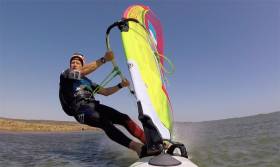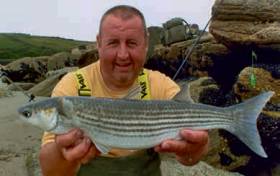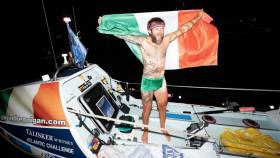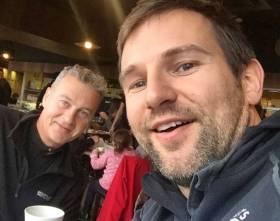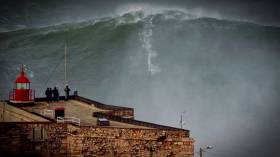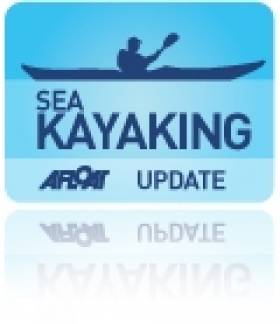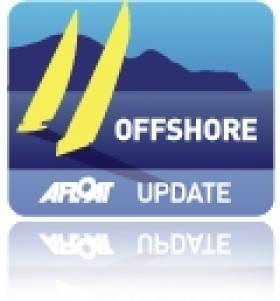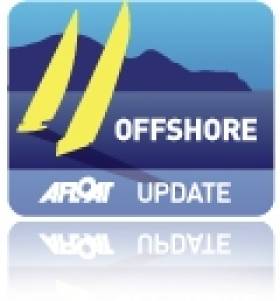Displaying items by tag: record
Watch Windsurfer Oisín Van Gelderen Set Irish Speed Sailing Record
#SpeedRecord - Oisín van Gelderen has released an extended video of his Irish speed sailing record-setting run in the south of France last spring.
As previously reported on Afloat.ie, the windsurfer took to the lagoon at La Palme in the Occitanie region on 6 April 2017, after many days of waiting for the right conditions.
His new outright Irish speed sailing record of 42.16 knots over 500 metres was later ratified by the World Speed Sailing Record Council (WSSR), smashing the late John Kenny’s then longstanding record.
“All along it was my goal to try and break the 50 knot barrier (even as a VMax peak), and push my 500m speed (and the Irish record) up as close to 50 as I could,” he told Afloat.ie.
“Unfortunately the conditions didn't allow (wind not strong enough or at the wrong angle), and although the speed I set in La Palme broke my late friend John Kenny’s previous WSSRC 500m Irish Record by a couple of knots, ironically my own GPS Speeds are much faster.
Van Gelderen added: “I have national GPS Records too by GPS - which is much cheaper to do as I can concentrate on chasing the wind and finding the perfect location such as BunBeg in Donegal, or the Dungarvan Speed Strip at Abbeyside.
“But WSSRC 500m ratified speeds are still considered the ‘official’ national/world records.”
Afloat’s sailor of the month for September 2010 said that the current season has so far not been conducive to GPS speed sailing in Ireland.
“We have had plenty of wind, but never at the right angle - when the tide is also correct to give the right conditions.
“So for me the chase continues. and I will enter the two other WSSRC events this year – one again in the south of France at Le Rouet beach, and the second in Luderitz, Namibia."
Van Gelderen said he has tried to get to Namibia’s Skeleton Coast, where Paul Larsen set the outright record on Vestas Sailrocket 2 in 2012, for a number of years.
“It’s the ultimate course,” he says of the Luderitz Speed Challenge, “where all the world records and top 40 fastest speeds in the world come from.”
Afloat.ie wishes Oisín the best of luck in his efforts to make a mark for Ireland on the world speed sailing stage.
Record-Smashing Golden Grey Mullet Landed In Cork
#Angling - Dublin angler Ian Mulligan has broken the golden grey mullet record, which was established as recently as 2014.
The new record, weighing 1.29 kg, was caught at Rosscarbery, Co Cork on 4 July 2017 and was recently ratified by the Irish Specimen Fish Committee (ISFC), which has just published its annual report for 2017.
The ISFC, which is supported by Inland Fisheries Ireland, is an independent voluntary body which verifies and records the capture of large fish caught on rod by anglers in freshwater and marine waters.
As well as the new record, detailed information on 422 specimen fish (large fish) taken by anglers from venues throughout Ireland in 2017, comprising many different species, is detailed in the report.
The main species were smaller shark species like smooth hound and spurdog and carp, the latter of which dominated freshwater. All fish were caught, weighed, measured and released.
The Irish Specimen Fish Committee Report 2017 is available to download HERE. Hard copies of the report are available from Inland Fisheries Ireland offices nationally.
Meanwhile, the ISFC Awards Day, when anglers will be presented with their awards and certificates, will be held on Saturday 17 February in conjunction with the Irish Angling Show in Dublin.
Hennigan Wins Battle And Takes Third in Atlantic Rowing Race
#Rowing: Gavan Hennigan traversed the finish line in the Talisker Whisky Atlantic Challenge tonight and marked himself out as a record breaker. The 35-year-old Galway man took 49 days to complete the row from La Gomera in the Canaries to Antigua in the West Indies. He became the fastest Irishman to row across the Atlantic, less than half the time taken by Sean McGowan (118 days) on this route in 2010; he also beat the record set by Irish-born Briton Tom McClean, who rowed across the North Atlantic in 55 days in 1987.
Hennigan (35) won an exciting battle with the three-man American Oarsmen to take third of the 12 boats in the race. The American crew pushed hard over the final week and almost caught the Irishman. Though they covered impressive distances each day, Hennigan matched and even outpaced them.
The crew which won, Latitude 35, set a new world record. It had a four-man crew, as did the second boat to finish, Row for James.
Taking their places behind Hennigan are a four, three trios, two pairs and three solos.
Hennigan is not the fastest man to row solo across the Atlantic, as stated in one media outlet. In 2013, Charlie Pitcher became the fastest solo rower to cross the Atlantic in an open class boat: he crossed from La Gomera to Barbados in 35 days and 33 minutes. The statistics are available on oceanrowing.com.
What a wonderful achievement by Gavan Hennigan. When he said he thought he could complete the race in 50 days, I thought it was hugely ambitious for a first-timer. And then he beat it! Amazing.
You might be able to confirm something for me. Is he now the fastest solo rower over the La Gomera to Antigua course? And do you know where he ranks in the list of solo rowers to cross the Atlantic?
He told me you were a key part of the team he had ‘on land’. Well done to all!
Yours,
Liam Gorman, Rowing Correspondent, The Irish Times
00353 (0)86 8051830
Atlantic Rower Hennigan Sets Up Exciting Finish
#Rowing: After 5,000 kilometres of rowing, Gavan Hennigan is in a race to the line in the Talisker Whisky Atlantic Challenge. The three men of American Oarsmen are finishing fast, hoping to take third from the Irishman in the row from the Canary Islands to the West Indies. The American boat has been hitting remarkable numbers (93 nautical miles per day/172 km) but Hennigan retains a slight lead as the crews dash to the finish in English Harbour in Antigua. Both crews should finish late on Wednesday night or early on Thursday.
The race started on December 14th in the Canary Islands. Hennigan (35) is set for a new Irish record for a solo oarsman rowing across an ocean. The crew which won, Latitude 35, set a new world record. It had a four-man crew, as did the second boat to finish, Row for James.
‘World’s Biggest Wave’ Recorded Off Ireland
#RecordWave - Nineteen metres is the height of what’s being called the world’s largest wave, recorded recently off the North West Coast of Ireland.
Independent.ie reports on the record-breaking swell detected by a weather buoy in the North Atlantic between Ireland and Iceland, following what the World Meteorological Organization’s (WMO) Commission for Climatology described as a “very strong” cold front that passed through at more than 80km per hour.
WMO Assistant Secretary-General Wenjian Zhang said: ”This is the first time we have ever measured a wave of 19 metres. It is a remarkable record.”
The new measurement beats the previous record of 18.275 metres recorded in the North Atlantic nine years ago.
But while the news is causing gasps around the internet, for some it only confirms what’s long been known — that Ireland is on the doorstep of a big wave paradise.
Indeed, Ireland’s North West is no stranger to monster swells, with the giant surf offshore from Mullaghmore in Co Sligo a well-kept secret among the big wave surfing fraternity.
British Rowers Rescued In Atlantic Record Attempt
#Rowing - Four intrepid British women were rescued from the Mid Atlantic in the early hours of this morning (Sunday 14 February) after capsizing during a rowing record attempt for charity.
As the Guardian reports, Gemma Chalk, Clare Lanyon, Jane McIntosh and Olivia Wilson were aiming to break the women's rowing speed record from the Canary Islands to Barbados when they lost their oars and GPS system after a series of capsizes some 400 nautical miles off Cape Verde.
But the women were able to get in contact with the UK Coastguard by satellite phone and activate an emergency beacon to direct passing vessels to their location – and they were finally picked up by a Canada-bound bulk carrier that diverted course to go to their aid.
“This shows you how important it is to be prepared for your voyage and have several means of contacting the coastguard or raising an alarm, even if you are not in UK waters," said UK Coastguard duty controller Ian Guy.
The Guardian has more on the story HERE.
New Round-Ireland Kayaking Record In The Offing
#Kayaking - It hasn't been the best summer for long-distance kayaking in Ireland, what with Manx duo Keirron Tastagh and George Shaw being forced to abandon their round-Ireland effort three weeks ago.
And that's not to mention exhaustion getting the better of pizza-oven maker Hendrik Lepel on the first leg of his voyage from Kinsale to Germany.
But two expeditions currently under way may have better chances as the weather improves.
The42.ie brings news of Jon Hynes and Sean Cahill's "once in a lifetime" kayaking trip round Ireland, which began on 16 June near the former's Kinsale home.
Taking a clockwise route around the island of Ireland, as of yesterday (Tuesday 30 June) the pair were taking shelter in Broadhaven Bay, Co Mayo awaiting a break in the weather to proceed to Donegal and on to the north coast and the half-way mark.
“It's definitely the pinnacle of expedition kayaking when you’re trying to get around Ireland in this type of weather!" said Hynes, who can boast of some 60 years of kayaking experience between him and Cahill.
However, ahead of them is an even more elite kayaker in the form of Waterford man Mick O'Meara, who as of yesterday was just four days shy of setting a brand new speed record for a solo circumnavigation of Ireland, as The Irish Times reports.
If O'Meara - a multiple-time Liffey Descent winner – reaches his hometown of Tramore by this Friday 3 July, he will have shaven two days off the record set by Jeff Allen and Harry Whelan on the 1,200km voyage in 2011.
#roundirelandspeedrecord – With arguably the hardest part of the 700–mile journey already over, the northabout Oman Sail Trimaran is 75–miles off the Sligo/Mayo coast and on target to break the Round Ireland Speed Sailing record of one day and 20 hours. Having covered 300 nautical miles in 19–hours, the fastest part of this voyage is yet to come.
The six man crew were heading in a southerly direction (190 degrees) just before noon, expecting to crack sheets and accelerate down the west coast in some forecasted big winds, ready to reach estimated speeds of over 30–knots before the Fastnet rock.
#omansail – The Oman Sail Trimaran crossed the Dublin Bay start line and headed northabout just after 6pm this evening in its latest bid to break the twenty–year Round Ireland Speed Record held by the late American adventurer Steve Fossett. French skipper Sidney Gavignet at the helm of the 70–footer cleared the Kish lighthouse start line, flying a hull and producing a cloud of spray as one of the fastest boats in the world reached full speed. Gavignet must beat a 44–hour record and be back on Dublin Bay just after lunch on Wednesday.
Winds on Dublin bay were at 18–knots and gusting to over 25 this evening presenting ideal conditions for this professional crew. Onboard are Alex Pella from Spain and Jean Baptiste Levaillant together with three Omani sailors and skipper Gavignet.
The southerly direction of the Dublin Bay breeze produced lumpy, one metre waves, giving Irish World Speed Sailing Commissioner Chris Moore a difficult berth for officiating the record bid from the Dublin Bay Sailing Club starting vessel located just off the Burford bank.
Having arrived from France only this morning, Gavignet took only the briefest pitstop at the National Yacht Club in Dun Laoghaire Harbour before heading back out to sea for what amounts to his third attempt at the Round Ireland speed record in recent years. Gavignet tried to break the record previously in 2013 but was beaten back by strong winds in the Irish Sea. By starting this evening he has made good on a promise to return and make a record attempt.
With potentially only one night at sea, which must be helpful for record-breaking, the current forecast suggests there's just a chance of some nor'east before they get to the South Rock, and there's a chance also of a flat spot on Tuesday evening. But either way it's a good forecast for Oman who must average 16–knots to be in with a chance.
Last season, the trimaran crossed the finish line of the 2014 Sevenstar Round Britain and Ireland Race off the Royal Yacht Squadron in Cowes in August with an elapsed time of three days, 03 hours, 32 minutes, 36 seconds breaking the previous World Record for a multihull held by Banque Populaire 5 in 2011, by 16 minutes, 38 seconds.
Within minutes of crossing the line this evening, the 70–foot colourful vessel had cleared the capital's waters and disappeared into the mist of the Irish Sea. Her six man crew recognising there are over 700–miles between them and a record that has stood the test of time since 1993. In September 1993, Fossett, (sailing with Con Murphy, Cathy MacAleavey, David Scully and Brian Thompson) put the Kish astern again after 44 hours 42 minutes and 20 seconds an average of 15.84 knots. It's a record which has stood for over 19 years but wiill it still be standing on Wednesday? Sources close to the crew say they are confident of knocking up to ten hours off the record time and are expecting to be home by Wednesday morning.
Trimaran Sets World Speed Sailing Record On English Channel
#englishchannelsailing – The San Francisco-based Lending Club report that its CEO Renaud Laplanche and co-skipper Ryan Breymaier established a new world speed sailing record across the English Channel.
The sailors went from the Royal Yacht Squadron Cowes, Isle of Wight to Dinard, France, in 5 hours, 15 minutes, subject to ratification by the World Speed Sailing Record Council, aboard their 105-foot offshore trimaran Lending Club 2 at an average speed of 26.36 knots.
Other crewmembers included Jan Majer, Stanislas Delbarre, Olivier Laplanche, navigator Boris Herrmann, French racing veterans Jean-Baptiste Le Vaillant and Roland Jourdain, and OBR Quin Bisset. Shore-based weather routing was provided by Wouter Verbraak.
The previous record of 5 hours, 23 minutes was established by skipper Brian Thompson, Irish navigator Adrienne Cahalan and the crew of Maiden II, a 110-foot catamaran, in September 2002 at an average speed of 25.6 knots.



























